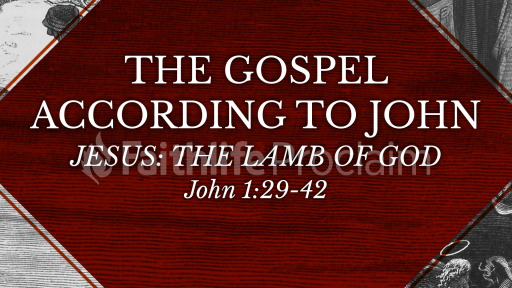John 1:29-42 | Jesus, The Lamb of God

Scripture Reading
Introduction
Body
“It combines in one descriptive term the concepts of innocence, voluntary sacrifice, substitutionary atonement, effective obedience, and redemptive power like that of the Passover Lamb (Exod. 12:21–27)”
1. The Passover lamb (Exod 12). This is perhaps the strongest contender, as the writer of the Gospel of John applies the Passover lamb imagery to Christ at His death (John 19:36, citing Exod 12:46). Moreover, the Gospel dates Jesus’ death to the time of the slaying of the Passover lambs (John 18:28; 19:14, 31). However, the Passover sacrifice was not oriented towards taking away sin.
2. The Suffering Servant (Isa 53). The Suffering Servant bears the sins of the people of Israel (Isa 53:6–12) and is described as a lamb (ἀμνός, amnos) led to the slaughter (Isa 53:7 LXX; compare Acts 8:32; 1 Pet 1:19). John 12:38 cites Isaiah 53:1 in application to Jesus. Although this may not have been the only Old Testament text behind the phrase, it is very likely one of them.
3. The lamb sacrificed daily in the temple (Lev 1:4; Exod 29:38–46). The Greek word “lamb” (ἀμνός, amnos, see John 1:29, 36) appears 75 times in the Septuagint, mostly in reference to the lamb sacrificed daily to make atonement. However, this atonement lamb does not receive much attention elsewhere in Scripture and thus is probably not the referent of John’s phrase.
4. The “lamb” Abraham offered in place of Isaac (Gen 22). The account in Genesis clearly uses substitutionary and sacrificial language (Gen 22:13), and the New Testament authors invoke this account as foreshadowing Christ (Gen 22:16; Matt 3:17; Rom 8:32). However, Genesis does not present this sacrifice as taking away sin. In addition, the Septuagint uses the word “sheep” (πρόβατον, probaton) rather than “lamb” (ἀμνός, amnos) in this account (Gen 22:7 LXX). The actual animal that was sacrificed in place of Isaac was a “ram” (κριός, krios; Gen 22:13 LXX).
It is very likely that, if I had time to explain to you, my hearer, the fulness of your sin and the utter ruin of your natural state, you also would grow angry. Yet you would have no cause to be angry, for all that I could say would fall far short of the truth about your real condition in the sight of God; and it is most solemnly important for you to know that, however high you may stand in the ranks of merely moral men, you are a lost soul, and a condemned soul, so long as you remain without living faith in the Lord Jesus Christ.
The fault is not in the gospel which we preach, so you should not be angry with it, or with us; the fault is in your own selves, in your own hearts and lives; and if you do not like to be told the truth about sin, it is a sure sign that your heart is not right in the sight of God. It is still true that “every one that doeth evil hateth the light, neither cometh to the light, lest his deeds should be reproved.”
When Jesus Christ was put into our place, our sin was laid upon him; and sin, like anything else, cannot be in two places at one time. If, then, I, being a believer in Jesus, know that all my sin was laid upon Christ, it follows necessarily that I have no sin left Upon me. It has become Christ’s burden; he has taken it away from me. “Yes,” you say, “but then the sin is still on Christ.” Ah! but, my hearers, if our Lord Jesus Christ, “his own self bare our sins in his own body up to the tree,” he there endured all the punishment that was due to us, or an equivalent for it, and those sins were by that means put away; that is to say, they ceased to be; so they do not exist any longer. All my indebtedness to God was transferred to Christ, and he paid all my debts.
Conclusion
When Dr. Judson went home to America from Burmah, there was a large congregation gathered together, and they requested the returned missionary, the veteran of so many years of service, to address the assembly. He stood up, and simply told the story that I have again told you to-night, the story of Christ suffering in the stead of sinners, and of Christ saving all who trust him. Then he sat down; and one who sat next him said to him, “I am afraid the friends are rather disappointed; they expected to hear something interesting from you.” He said, “I have spoken to them, to the best of my ability, upon the most interesting subject in the whole world; what could I have done better than that?” “Yes,” said the other; “but, after having been so long abroad, they thought that you would tell them some interesting story; they did not think you would come all the way from Burmah just to tell them only that.” The missionary then rose, and said, “I should like to go home feeling that, although I have come all the way from Burmah, I do not know anything that I can tell you that I think is half so good for you to hear, or half so interesting, as the story of the love of Christ in dying to save sinners.” The good doctor was right; and I feel, just as he did, that there is nothing so interesting as the story of the cross. You want to hear it, you who are already saved; and you want to hear it, you who are not yet saved. You must hear it, for there is no hope of salvation for you except as faith shall come to you by hearing, and specially hearing that portion of the Word of God which deals most closely with the cross of Christ.